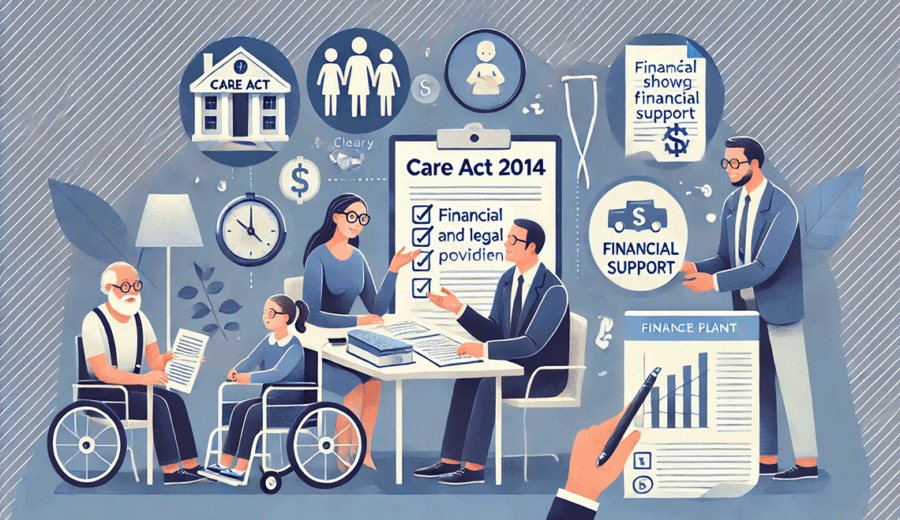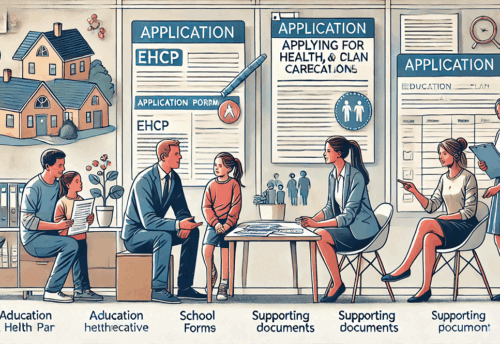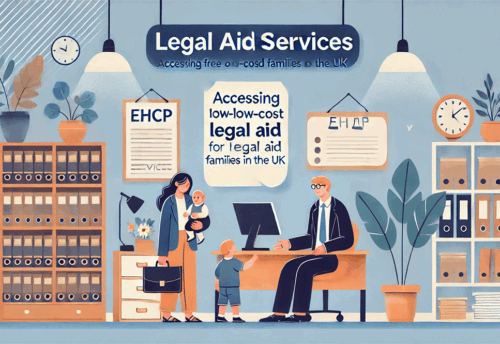
November 27, 2024
Financial and Legal Provisions for Disabled Children
The Care Act 2014: Financial and Legal Provisions for Disabled Children
The Care Act 2014 is a cornerstone of social care legislation in the UK, providing essential rights and support for disabled individuals, including children. While the primary focus is on adult care, it has significant implications for families of disabled children, particularly in transition planning, financial assistance, and legal rights. Here’s an in-depth exploration of its provisions:
1. Purpose of The Care Act 2014
The Care Act 2014 aims to:
- Establish a clear legal framework for social care.
- Promote well-being and independence for disabled individuals.
- Ensure a seamless transition from children’s to adult care services.
- Provide financial and practical support to families.
2. Key Provisions for Disabled Children
2.1 Transition Planning
- The Act ensures continuity of care as disabled children approach adulthood.
- Local authorities must assess the child’s needs and plan for adult services well before their 18th birthday.
2.2 Carer’s Assessments
- Parents or caregivers of disabled children are entitled to an assessment of their needs.
- This identifies the support required to balance caregiving with other responsibilities, such as employment.
2.3 Support for Families
- Local authorities must offer assistance in accessing care services, financial support, and housing adaptations.
2.4 Information and Advocacy
- Families have the right to clear information about available services.
- Advocacy services must be provided to help families navigate complex systems.
3. Financial Provisions Under the Act
3.1 Personal Budgets
- Local authorities provide personal budgets to meet care needs, allowing families to manage funds for tailored support.
3.2 Direct Payments
- Families can receive direct payments to arrange care services themselves, offering flexibility and control.
3.3 Charging Rules
- Care services for children are typically free. However, as they transition to adult services, financial assessments determine contributions.
3.4 Funding for Housing Adaptations
- Disabled Facilities Grants (DFGs) are available to modify homes for accessibility, such as installing ramps or lifts.
4. Legal Rights for Families
4.1 Entitlement to Assessments
- Child’s Needs Assessment: Determines the child’s care requirements.
- Carer’s Assessment: Evaluates the support needed by parents or guardians.
4.2 Right to Appeal
- Families can challenge local authority decisions regarding care or funding.
- The Act ensures access to complaints procedures and, if necessary, legal redress.
4.3 Safeguarding
- The Act places a duty on local authorities to protect disabled children from harm or neglect.
5. Transition to Adulthood
5.1 Preparing for Adulthood
- Transition planning begins at least two years before the child turns 18.
- Includes assessments of education, employment, and independent living needs.
5.2 Continuity of Care
- If adult services are delayed, the local authority must continue providing children’s services until a smooth transition is ensured.
6. How to Access Support
6.1 Contact Local Authorities
- Request assessments for care and support needs through the social services department.
6.2 Advocacy Services
- Organizations like IPSEA and Contact offer guidance on navigating The Care Act.
6.3 Legal Aid
- Families with limited income may qualify for free legal aid to address disputes or appeals.
7. Challenges and Solutions
7.1 Lack of Awareness
- Families are often unaware of their rights under The Care Act. Local Offer websites provide detailed guidance on available services.
7.2 Resource Constraints
- Advocate for timely assessments and explore alternative funding sources, such as grants from charities.
7.3 Complexity
- Engage support services or legal advisors to navigate complex care systems.
8. Key Resources
- GOV.UK:
- Provides official guidance on The Care Act and related services.
- Local Offer Websites:
- Lists services and support specific to each local authority.
- Charities and Advocacy Groups:
- Organizations like Scope and Contact offer free advice and resources.
9. Practical Steps for Families
- Request Assessments Early:
- Initiate discussions with local authorities well before transition periods.
- Keep Detailed Records:
- Document all communications, assessments, and care plans.
- Engage Advocacy Services:
- Seek support from professionals to ensure your rights are upheld.





Leave a Reply